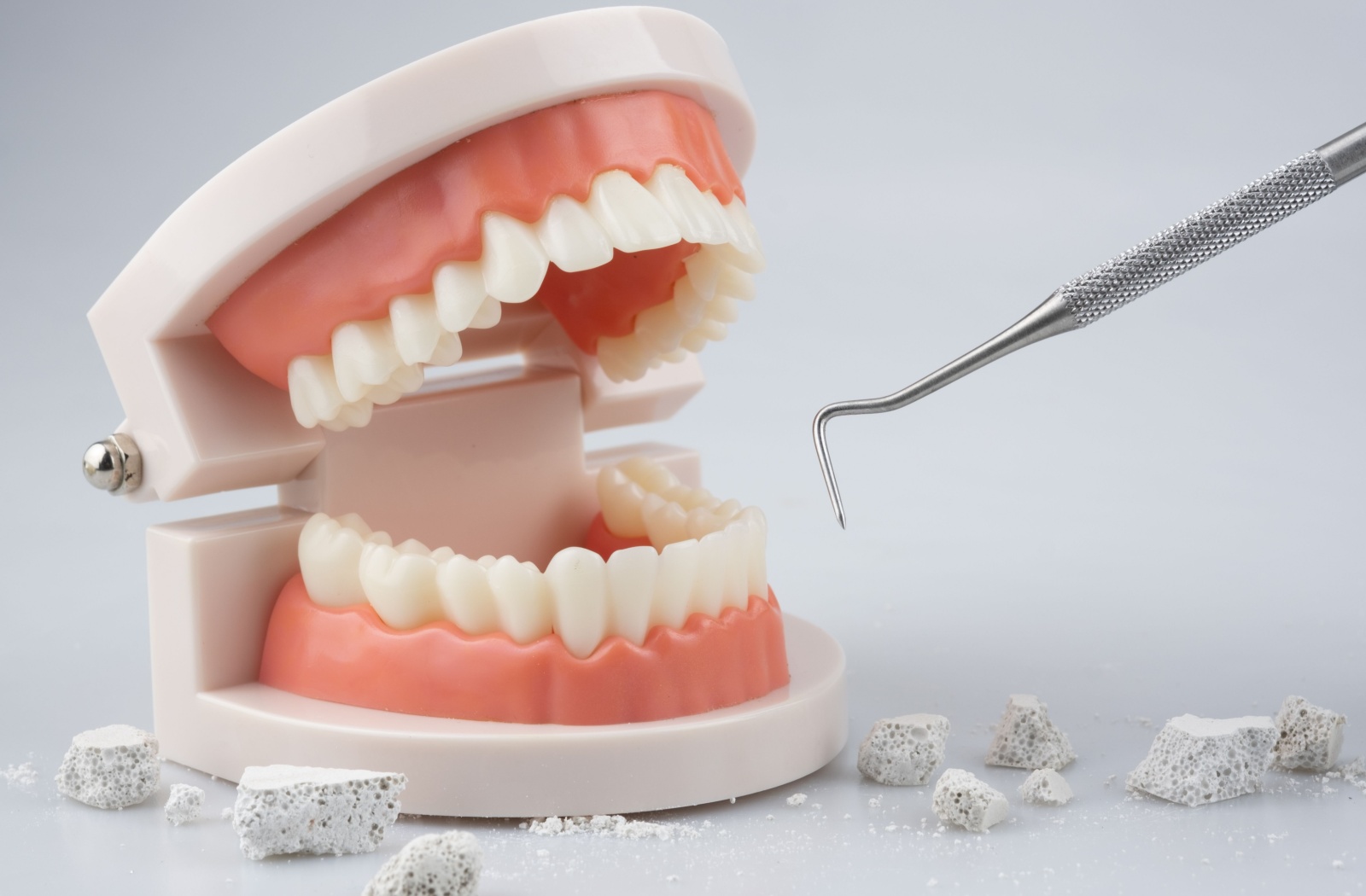Tartar, also known as dental calculus, is a hardened plaque that forms on your teeth and can lead to later dental health issues if not addressed. It forms when plaque, the sticky film of bacteria that builds up on your teeth after eating and drinking, hardens over time.
Plaque is composed of bacteria, food particles, and saliva, and it can accumulate quickly if not removed regularly through brushing and flossing. Once plaque hardens into tartar, it may require special care to remove. Visits to your dentist can help you effectively manage tartar buildup, prevent cavities, and protect your oral health.
Understanding Tartar
Tartar forms when plaque, the sticky film of bacteria that builds up on your teeth after eating and drinking, hardens over time. Plaque is composed of bacteria, food particles, and saliva, and it can accumulate quickly if not removed regularly. This hardening process occurs when plaque is not effectively removed through daily brushing and flossing, allowing it to mineralize and become tartar.
Once tartar has formed, it becomes a rough and porous substance that can lead to gum inflammation and cavities. Unlike plaque, tartar cannot be removed with regular brushing and flossing alone; it requires the attention of a dental professional for removal during a cleaning at the dentist’s office. Regular dental checkups and good oral hygiene are essential to prevent tartar buildup and maintain overall oral health.
Why It’s Important to Remove Tartar
- Prevent gum disease: Tartar buildup can lead to gingivitis, which is the early stage of gum disease characterized by red, swollen gums that may bleed easily. If gingivitis is left untreated, it can progress to periodontitis, a more severe form of gum disease that affects the tissues and bones supporting the teeth, potentially leading to tooth loss and other serious health issues.
- Maintain oral health: Keeping tartar at bay is crucial for maintaining overall oral hygiene. Regular dental cleanings and good oral care habits help prevent cavities, reduce the risk of tooth decay, and promote fresh breath. A clean mouth not only feels better but also contributes to better overall health by reducing the risk of systemic diseases linked to poor oral hygiene.
- Aesthetic reasons: Tartar is porous and tends to absorb stains easily from foods, drinks, and tobacco, causing your teeth to appear yellow or brown over time. This discolouration can impact your smile and overall appearance. Regular cleaning helps maintain a bright, white smile.
Steps to Prevent & Manage Tartar Buildup
1. Maintain Good Oral Hygiene
- Brush twice a day: It’s important to use a toothbrush with soft bristles to avoid damaging your gums and enamel. Pair it with fluoride toothpaste to strengthen your teeth and fight cavities. Make sure to brush for at least 2 minutes, ensuring you cover all surfaces of your teeth, including the front, back, and chewing surfaces, to effectively remove plaque and food particles.
- Floss daily: Flossing is a critical step in maintaining oral hygiene as it removes plaque and food particles from between teeth and under the gumline—areas your toothbrush can’t reach. This helps prevent gum disease and cavities in these hard-to-clean areas. Use a gentle sawing motion and curve the floss around each tooth for a thorough clean.
- Use mouthwash: Incorporating an antiseptic mouthwash into your oral care routine can help reduce bacteria in your mouth, thereby preventing plaque buildup and freshening your breath. Choose a mouthwash with antibacterial ingredients and swish it around your mouth for about 30 seconds to maximize its benefits.
- Use water flosser: A water flosser is an effective tool for enhancing oral hygiene. It uses a pulsating stream of water to remove food particles and plaque from between teeth and along the gumline. This affordable and pain-free device is recommended by dentists as a valuable addition to regular brushing and flossing routines, helping maintain healthier gums and a cleaner mouth overall.
2. Regular Dental Checkups
- Schedule visits to your dentist every 6 months for professional cleanings and exams. Dental professionals use special tools to remove tartar effectively and assess your oral health.
3. Consider Tartar-Control Toothpaste
- Some toothpastes are designed to slow down the buildup of tartar with active ingredients like pyrophosphates and zinc citrate.
4. Eat a Balanced Diet
- Limit sugary and starchy foods, which contribute to plaque formation. Include plenty of fruits, vegetables, and whole grains in your diet to aid saliva production, which naturally cleanses the mouth.
5. Stay Hydrated
- Drinking water throughout the day helps wash away food particles and reduces the chance of plaque turning into tartar.
6. Quit Smoking
- Tobacco use increases tartar buildup and can lead to gum disease. Quitting smoking can improve your oral health and overall well-being.
Professional Tartar Removal
If you have significant tartar buildup, only a dental professional can effectively remove it. Dental professionals use specialized tools such as scalars and ultrasonic devices to gently and thoroughly scrape off tartar both above and below the gumline. This process helps in maintaining oral health by preventing gum disease and tooth decay, helping your teeth and gums stay healthy.
When it’s Time to Consider Professional Advice
By maintaining good oral hygiene habits and visiting your dentist regularly, you can prevent tartar buildup and keep your smile healthy and bright. If you notice signs of tartar on your teeth, such as rough spots or discolouration, book an appointment with Markham Dental Smiles for an evaluation. Remember, healthy teeth are the foundation for a healthy body, so take proactive steps to maintain your oral health today!







